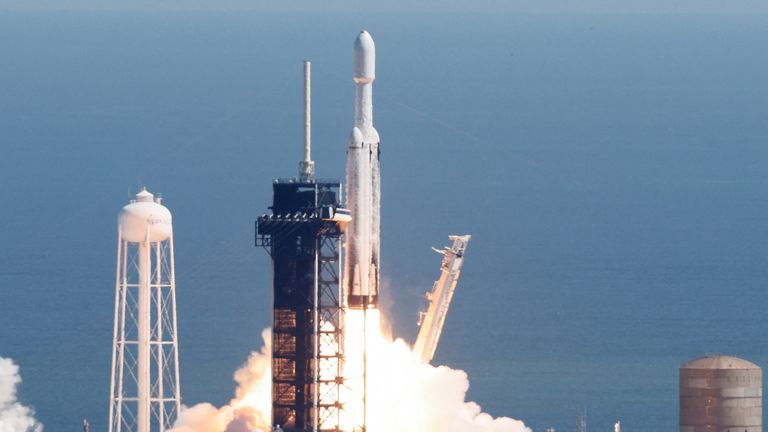A NASA spacecraft has launched from Florida on a mission to establish whether Jupiter’s icy moon Europa could support life.
The craft, called Europa Clipper, was on a SpaceX Falcon Heavy rocket which blasted off from Kennedy Space Center in Cape Canaveral under sunny skies.
Its launch had been delayed for several days by the deadly Hurricane Milton that struck the US state last week.
The mission’s main scientific goal is to establish whether there are places below the surface of the moon that can harbour life.
Scientists are interested in the salty liquid water ocean, 40-100 miles deep, that previous observations have shown is under Europa’s thick 10-15 mile icy shell. And where there is water, there could be life.
The robotic solar-powered spacecraft, that is carrying nine scientific instruments, will travel 1.8 billion miles in a trip lasting about five and a half years and is due to enter orbit around Jupiter in 2030.
It will carry out 49 close flybys of Europa over three years, gathering detailed measurements to investigate the moon.
The probe, which is about as large as a basketball court, will fly as low as 16 miles above the surface, soaring over a different location during each flyby to scan nearly the entire moon.
It will not look for life but will focus on the ingredients necessary to sustain life – searching for organic compounds and other clues as it uses radar to peer beneath the ice for suitable conditions.
Europa Clipper, which is around 30m long and 17m wide with its antennas and solar panels – and weighs nearly six tonnes, is the largest spacecraft the US space agency has ever built for a planetary mission.
Its solar panels will gather sunlight for powering scientific instruments, electronics and its other subsystems in the £3.9bn mission.
The moon has been viewed as a potential habitat for life beyond Earth in our solar system.
NASA said: “The mission’s three main science objectives are to understand the nature of the ice shell and the ocean beneath it, along with the moon’s composition and geology.”
“The mission’s detailed exploration of Europa will help scientists better understand the astrobiological potential for habitable worlds beyond our planet,” the agency added.
Europa, with a diameter of nearly 2,000 miles, is the fourth-largest of Jupiter’s 95 officially-recognised moons.
Even though it is just a quarter of Earth’s diameter, its vast global ocean of salty liquid water may contain twice the water that is in Earth’s oceans.
The mission’s deputy project scientist Bonnie Buratti said: “There is very strong evidence that the ingredients for life exist on Europa. But we have to go there to find out.”
The planetary scientist, from NASA’s Jet Propulsion Laboratory, added: “Just to emphasise: we’re not a life-detection mission. We’re just looking for the conditions for life.”



























